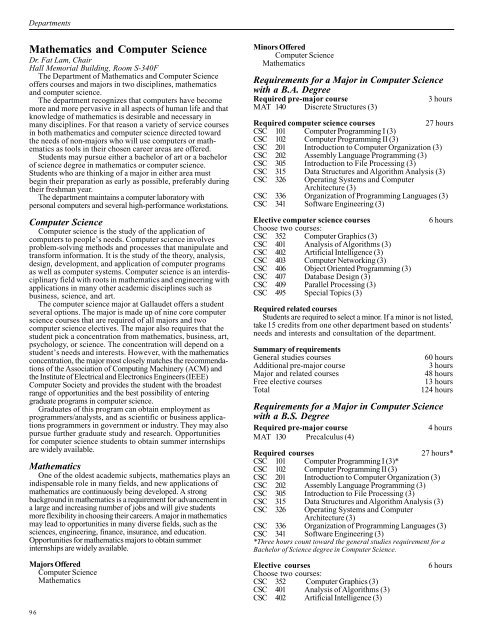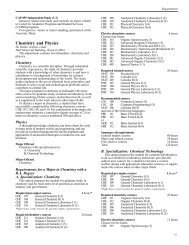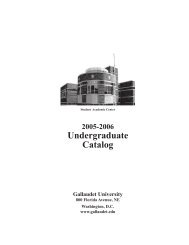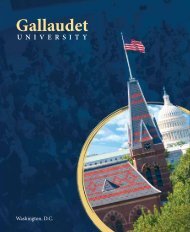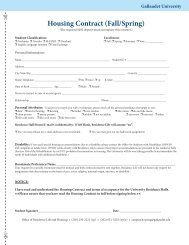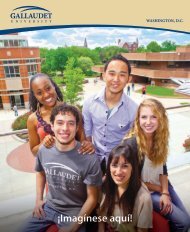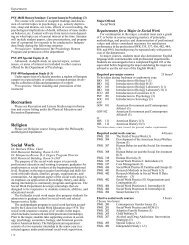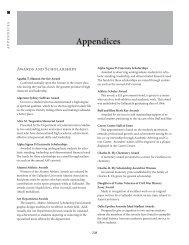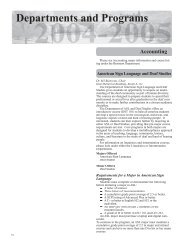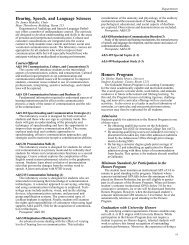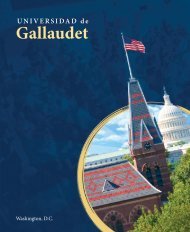Mathematics and Computer Science
Mathematics and Computer Science
Mathematics and Computer Science
You also want an ePaper? Increase the reach of your titles
YUMPU automatically turns print PDFs into web optimized ePapers that Google loves.
Departments<br />
<strong>Mathematics</strong> <strong>and</strong> <strong>Computer</strong> <strong>Science</strong><br />
Dr. Fat Lam, Chair<br />
Hall Memorial Building, Room S-340F<br />
The Department of <strong>Mathematics</strong> <strong>and</strong> <strong>Computer</strong> <strong>Science</strong><br />
offers courses <strong>and</strong> majors in two disciplines, mathematics<br />
<strong>and</strong> computer science.<br />
The department recognizes that computers have become<br />
more <strong>and</strong> more pervasive in all aspects of human life <strong>and</strong> that<br />
knowledge of mathematics is desirable <strong>and</strong> necessary in<br />
many disciplines. For that reason a variety of service courses<br />
in both mathematics <strong>and</strong> computer science directed toward<br />
the needs of non-majors who will use computers or mathematics<br />
as tools in their chosen career areas are offered.<br />
Students may pursue either a bachelor of art or a bachelor<br />
of science degree in mathematics or computer science.<br />
Students who are thinking of a major in either area must<br />
begin their preparation as early as possible, preferably during<br />
their freshman year.<br />
The department maintains a computer laboratory with<br />
personal computers <strong>and</strong> several high-performance workstations.<br />
<strong>Computer</strong> <strong>Science</strong><br />
<strong>Computer</strong> science is the study of the application of<br />
computers to people’s needs. <strong>Computer</strong> science involves<br />
problem-solving methods <strong>and</strong> processes that manipulate <strong>and</strong><br />
transform information. It is the study of the theory, analysis,<br />
design, development, <strong>and</strong> application of computer programs<br />
as well as computer systems. <strong>Computer</strong> science is an interdisciplinary<br />
field with roots in mathematics <strong>and</strong> engineering with<br />
applications in many other academic disciplines such as<br />
business, science, <strong>and</strong> art.<br />
The computer science major at Gallaudet offers a student<br />
several options. The major is made up of nine core computer<br />
science courses that are required of all majors <strong>and</strong> two<br />
computer science electives. The major also requires that the<br />
student pick a concentration from mathematics, business, art,<br />
psychology, or science. The concentration will depend on a<br />
student’s needs <strong>and</strong> interests. However, with the mathematics<br />
concentration, the major most closely matches the recommendations<br />
of the Association of Computing Machinery (ACM) <strong>and</strong><br />
the Institute of Electrical <strong>and</strong> Electronics Engineers (IEEE)<br />
<strong>Computer</strong> Society <strong>and</strong> provides the student with the broadest<br />
range of opportunities <strong>and</strong> the best possibility of entering<br />
graduate programs in computer science.<br />
Graduates of this program can obtain employment as<br />
programmers/analysts, <strong>and</strong> as scientific or business applications<br />
programmers in government or industry. They may also<br />
pursue further graduate study <strong>and</strong> research. Opportunities<br />
for computer science students to obtain summer internships<br />
are widely available.<br />
<strong>Mathematics</strong><br />
One of the oldest academic subjects, mathematics plays an<br />
indispensable role in many fields, <strong>and</strong> new applications of<br />
mathematics are continuously being developed. A strong<br />
background in mathematics is a requirement for advancement in<br />
a large <strong>and</strong> increasing number of jobs <strong>and</strong> will give students<br />
more flexibility in choosing their careers. A major in mathematics<br />
may lead to opportunities in many diverse fields, such as the<br />
sciences, engineering, finance, insurance, <strong>and</strong> education.<br />
Opportunities for mathematics majors to obtain summer<br />
internships are widely available.<br />
Majors Offered<br />
<strong>Computer</strong> <strong>Science</strong><br />
<strong>Mathematics</strong><br />
Minors Offered<br />
<strong>Computer</strong> <strong>Science</strong><br />
<strong>Mathematics</strong><br />
Requirements for a Major in <strong>Computer</strong> <strong>Science</strong><br />
with a B.A. Degree<br />
Required pre-major course<br />
3 hours<br />
MAT 140 Discrete Structures (3)<br />
Required computer science courses<br />
27 hours<br />
CSC 101 <strong>Computer</strong> Programming I (3)<br />
CSC 102 <strong>Computer</strong> Programming II (3)<br />
CSC 201 Introduction to <strong>Computer</strong> Organization (3)<br />
CSC 202 Assembly Language Programming (3)<br />
CSC 305 Introduction to File Processing (3)<br />
CSC 315 Data Structures <strong>and</strong> Algorithm Analysis (3)<br />
CSC 326 Operating Systems <strong>and</strong> <strong>Computer</strong><br />
Architecture (3)<br />
CSC 336 Organization of Programming Languages (3)<br />
CSC 341 Software Engineering (3)<br />
Elective computer science courses<br />
Choose two courses:<br />
CSC 352 <strong>Computer</strong> Graphics (3)<br />
CSC 401 Analysis of Algorithms (3)<br />
CSC 402 Artificial Intelligence (3)<br />
CSC 403 <strong>Computer</strong> Networking (3)<br />
CSC 406 Object Oriented Programming (3)<br />
CSC 407 Database Design (3)<br />
CSC 409 Parallel Processing (3)<br />
CSC 495 Special Topics (3)<br />
6 hours<br />
Required related courses<br />
Students are required to select a minor. If a minor is not listed,<br />
take 15 credits from one other department based on students’<br />
needs <strong>and</strong> interests <strong>and</strong> consultation of the department.<br />
Summary of requirements<br />
General studies courses 60 hours<br />
Additional pre-major course<br />
3 hours<br />
Major <strong>and</strong> related courses 48 hours<br />
Free elective courses 13 hours<br />
Total 124 hours<br />
Requirements for a Major in <strong>Computer</strong> <strong>Science</strong><br />
with a B.S. Degree<br />
Required pre-major course<br />
4 hours<br />
MAT 130 Precalculus (4)<br />
Required courses 27 hours*<br />
CSC 101 <strong>Computer</strong> Programming I (3)*<br />
CSC 102 <strong>Computer</strong> Programming II (3)<br />
CSC 201 Introduction to <strong>Computer</strong> Organization (3)<br />
CSC 202 Assembly Language Programming (3)<br />
CSC 305 Introduction to File Processing (3)<br />
CSC 315 Data Structures <strong>and</strong> Algorithm Analysis (3)<br />
CSC 326 Operating Systems <strong>and</strong> <strong>Computer</strong><br />
Architecture (3)<br />
CSC 336 Organization of Programming Languages (3)<br />
CSC 341 Software Engineering (3)<br />
*Three hours count toward the general studies requirement for a<br />
Bachelor of <strong>Science</strong> degree in <strong>Computer</strong> <strong>Science</strong>.<br />
Elective courses<br />
Choose two courses:<br />
CSC<br />
CSC<br />
352<br />
401<br />
<strong>Computer</strong> Graphics (3)<br />
Analysis of Algorithms (3)<br />
CSC 402 Artificial Intelligence (3)<br />
6 hours<br />
96
Departments<br />
CSC 403 <strong>Computer</strong> Networking (3)<br />
CSC 406 Object Oriented Programming (3)<br />
CSC 407 Database Design (3)<br />
CSC 409 Parallel Processing (3)<br />
CSC 495 Special Topics (3)<br />
Required related courses<br />
17 hours*<br />
MAT 140 Discrete Structures (3)<br />
MAT 150 Calculus I (4)*<br />
MAT 205 Calculus II (4)<br />
MAT 307 Linear Algebra (3)<br />
MAT 313 Probability <strong>and</strong> Statistics I (3)<br />
*Four hours count toward the general studies requirement for a<br />
Bachelor of <strong>Science</strong> degree in <strong>Computer</strong> <strong>Science</strong>.<br />
Elective related course<br />
Choose one course:<br />
MAT 206 Calculus III (4)<br />
MAT 314 Probability & Statistics II (3)<br />
MAT 328 Differential Equations (3)<br />
MAT 361 Numerical Analysis (3)<br />
MAT 410 Foundations of Geometry (3)<br />
MAT 434 Abstract Algebra (3)<br />
MAT 455 Advanced Calculus I (3)<br />
MAT 456 Advanced Calculus II (3)<br />
3-4 hours<br />
Summary of requirements<br />
General studies courses for a Bachelor of <strong>Science</strong><br />
degree in <strong>Computer</strong> <strong>Science</strong> 53-59 hours<br />
Pre-major course<br />
4 hours<br />
Major <strong>and</strong> related courses<br />
46-47 hours<br />
Free elective courses 14-21 hours<br />
Total 124 hours<br />
Requirements for a Major in <strong>Mathematics</strong> with a<br />
B.A. Degree<br />
Required pre-major course<br />
4 hours*<br />
To be taken during freshman year:<br />
MAT 130 Precalculus (4)<br />
*Three hours count toward the general studies requirements.<br />
Required mathematics courses<br />
MAT 150 Calculus I (4)<br />
MAT 205 Calculus II (4)<br />
MAT 206 Calculus III (4)<br />
MAT 210 Mathematical Proofs (3)<br />
MAT 307 Linear Algebra (3)<br />
MAT 313 Probability <strong>and</strong> Statistics I (3)<br />
MAT 328 Differential Equations (3)<br />
MAT 434 Abstract Algebra (3)<br />
MAT 455 Advanced Calculus I (3)<br />
Elective mathematics courses<br />
Choose two courses:<br />
MAT 314 Probability <strong>and</strong> Statistics II (3)<br />
MAT 320 History of <strong>Mathematics</strong> (3)<br />
MAT 361 Numerical Analysis (3)<br />
MAT 410 Foundations of Geometry (3)<br />
MAT 456 Advanced Calculus II (3)<br />
MAT 495 Special Topics (1-3)<br />
30 hours<br />
6 hours<br />
Summary of requirements<br />
General studies courses<br />
60 hours<br />
Additional pre-major course<br />
1 hour<br />
Major courses 36 hours<br />
Free elective courses 27 hours<br />
Total 124 hours<br />
Requirements for a Major in <strong>Mathematics</strong> with a<br />
B.S. Degree<br />
The Bachelor of <strong>Science</strong> degree in <strong>Mathematics</strong> will<br />
prepare students for graduate school. The Bachelor of<br />
<strong>Science</strong> degree is geared twoard a more science-intensive<br />
curriculum than the Bachelor of Arts degree in Mathmatics.<br />
Required pre-major courses<br />
8 hours*<br />
To be taken during freshman year:<br />
MAT 130 Precalculus (4)<br />
MAT 150 Calculus I (4)*<br />
*Four hours count toward the general studies requirements for a<br />
Bachelor of <strong>Science</strong> degree in <strong>Mathematics</strong>.<br />
Required mathematics courses<br />
MAT 205 Calculus II (4)<br />
MAT 206 Calculus III (4)<br />
MAT 210 Mathematical Proofs (3)<br />
MAT 307 Linear Algebra (3)<br />
MAT 313 Probability <strong>and</strong> Statistics I (3)<br />
MAT 328 Differential Equations (3)<br />
MAT 434 Abstract Algebra (3)<br />
MAT 455 Advanced Calculus I (3)<br />
Elective mathematics courses<br />
Choose two courses:<br />
MAT 314 Probability <strong>and</strong> Statistics II (3)<br />
MAT 361 Numerical Analysis (3)<br />
MAT 410 Foundations of Geometry (3)<br />
MAT 456 Advanced Calculus II (3)<br />
MAT 495 Special Topics (1-3)<br />
26 hours<br />
6 hours<br />
Summary of requirements<br />
General studies courses for a Bachelor of <strong>Science</strong><br />
degree in <strong>Mathematics</strong><br />
53-59 hours<br />
Additional pre-major course<br />
4 hours<br />
Major courses 32 hours<br />
Free elective courses 29-35 hours<br />
Total 124 hours<br />
Requirements for a Minor in <strong>Computer</strong> <strong>Science</strong><br />
Required courses 15 hours<br />
CSC 101 <strong>Computer</strong> Programming I (3)<br />
CSC 102 <strong>Computer</strong> Programming II (3)<br />
CSC 201 Introduction to <strong>Computer</strong> Organization (3)<br />
CSC 305 Introduction to File Processing (3)<br />
CSC 315 Data Structures <strong>and</strong> Algorithm Analysis (3)<br />
Total 15 hours<br />
Requirements for a Minor in <strong>Mathematics</strong><br />
Required mathematics courses<br />
12 hours<br />
MAT 150 Calculus I (4)<br />
MAT 205 Calculus II (4)<br />
MAT 206 Calculus III (4)<br />
Elective mathematics courses<br />
Choose two courses:<br />
MAT 307 Linear Algebra (3)<br />
MAT 313 Probability <strong>and</strong> Statistics I (3)<br />
MAT 314 Probability <strong>and</strong> Statistics II (3)<br />
MAT 320 History of <strong>Mathematics</strong> (3)<br />
MAT 328 Differential Equations (3)<br />
MAT 361 Numerical Analysis (3)<br />
MAT 410 Foundations of Geometry (3)<br />
MAT 434 Abstract Algebra (3)<br />
MAT 455 Advanced Calculus I (3)<br />
MAT 456 Advanced Calculus II (3)<br />
6 hours<br />
97
Departments<br />
MAT 495 Special Topics (1-3)<br />
Total 18 hours<br />
<strong>Computer</strong> <strong>Science</strong> Courses Offered<br />
CSC 100 <strong>Computer</strong> Literacy (3)<br />
Introduction to computers, computer use, <strong>and</strong> computers<br />
impact on society. H<strong>and</strong>s-on introduction to a text editor,<br />
document processor, <strong>and</strong> BASIC.<br />
Prerequisites: MAT 013 or the equivalent, <strong>and</strong> ENG 102<br />
CSC 101 <strong>Computer</strong> Programming I (3)<br />
This course will introduce problem-solving methods, a text<br />
editor <strong>and</strong> algorithm development, a high-level programming<br />
language, <strong>and</strong> techniques to design, code, <strong>and</strong> debug<br />
document programs.<br />
Prerequisite: MAT 013 or the equivalent<br />
CSC 102 <strong>Computer</strong> Programming II (3)<br />
This course will continue the development of discipline in<br />
program design, in style <strong>and</strong> expression, <strong>and</strong> in debugging<br />
<strong>and</strong> testing, especially for larger programs. It will also<br />
introduce algorithms analysis <strong>and</strong> basic aspects of string<br />
processing, recursion, internal search/sort methods, <strong>and</strong><br />
simple data structures.<br />
Prerequisite: CSC 101<br />
CSC 201 Introduction to <strong>Computer</strong> Organization (3)<br />
This course gives the organization <strong>and</strong> structuring of the<br />
major hardware components of computers. It provides the<br />
fundamentals of logic design <strong>and</strong> the mechanics of information<br />
transfer <strong>and</strong> control within a digital computer system.<br />
Prerequisites: CSC 102; MAT 140 recommended<br />
CSC 202 Assembly Language Programming (3)<br />
This course will provide basic concepts of programming<br />
systems, introduce computer architecture, <strong>and</strong> introduce an<br />
assembly language.<br />
Prerequisites: CSC 102; MAT 140<br />
CSC 295 Special Topics (1-3)<br />
Topics in computer science depending on the needs <strong>and</strong><br />
interests of the student.<br />
Prerequisite: Permission of the instructor<br />
CSC 305 Introduction to File Processing (3)<br />
This course will introduce concepts <strong>and</strong> techniques of<br />
structuring data on bulk storage devices, provide experience<br />
in the use of bulk storage devices, <strong>and</strong> provide the foundation<br />
for applications of data structures <strong>and</strong> file processing<br />
techniques.<br />
Prerequisites: CSC 102; MAT 140<br />
CSC 315 Data Structures <strong>and</strong> Algorithm Analysis (3)<br />
This course will apply analysis <strong>and</strong> design techniques to<br />
nonnumeric algorithms that act on data structures. It will also<br />
use algorithmic analysis <strong>and</strong> design criteria in the selection of<br />
methods for data manipulation in the environment of a<br />
database management system.<br />
Prerequisites: CSC 102; MAT 140; CSC 305 recommended<br />
CSC 326 Operating Systems <strong>and</strong> <strong>Computer</strong> Architecture (3)<br />
The course will introduce the major concept areas of<br />
operating systems principles, develop an underst<strong>and</strong>ing of<br />
both the organization <strong>and</strong> architecture of computer systems<br />
at the register-transfer <strong>and</strong> programming levels of system<br />
description, <strong>and</strong> study interrelationships between the<br />
operating system <strong>and</strong> the architecture of computer systems.<br />
Prerequisites: CSC 102, 315; MAT 140; CSC 202<br />
recommended<br />
CSC 336 Organization of Programming Languages (3)<br />
This course will develop an underst<strong>and</strong>ing of the organization<br />
of programming languages, especially the run time<br />
behavior of programs. It will also introduce the formal study<br />
of programming language specification <strong>and</strong> analysis <strong>and</strong> will<br />
continue the development of problem solution <strong>and</strong> programming<br />
skills introduced in the elementary level material.<br />
Prerequisites: CSC 102, 315; MAT 140; CSC 202, 305<br />
recommended<br />
CSC 341 Software Engineering (3)<br />
This course will present a formal approach to state-of-theart<br />
techniques in software design <strong>and</strong> development. It will<br />
expose students to the entire software life cycle, which<br />
includes feasibility studies, the problem specification, the<br />
software requirements, the program design, the coding<br />
phase, debugging, testing <strong>and</strong> verification, benchmarking,<br />
documentation, <strong>and</strong> maintenance. An integral part of the<br />
course will be involvement of students working in teams in<br />
the development of a large scale software project.<br />
Prerequisites: CSC 102; MAT 140<br />
CSC 352 <strong>Computer</strong> Graphics (3)<br />
Windowing environments <strong>and</strong> graphical user interfaces<br />
will be discussed. Experience will be provided with programming<br />
graphical interfaces. Transformations including<br />
windowing, clipping, geometrics, <strong>and</strong> perspectives. <strong>Computer</strong><br />
graphics applications.<br />
Prerequisite: CSC 102<br />
CSC 401 Analysis of Algorithms (3)<br />
Fundamental data structures <strong>and</strong> algorithms are reviewed:<br />
arrays, pointers, trees, <strong>and</strong> recursion. Sorting techniques<br />
such as quicksort, radix sort, heapsort, <strong>and</strong> mergesort are<br />
analyzed in relation to their computational complexity <strong>and</strong><br />
memory requirements. Searching methods, including binary,<br />
balanced trees, hashing, radix, <strong>and</strong> external are analyzed for<br />
computational complexity <strong>and</strong> memory requirements. String<br />
processing, pattern matching, cryptology, simple closed path,<br />
convex, hall, depth-first <strong>and</strong> breadth-first searches, connectivity,<br />
polynomial, Gaussian, <strong>and</strong> curve fitting algorithms will<br />
be applied to basic data sets.<br />
Prerequisite: CSC 102<br />
CSC 402 Artificial Intelligence (3)<br />
Artificial intelligence studies ways of making computers do<br />
intelligent tasks. These tasks include playing games, expertly<br />
solving problems, underst<strong>and</strong>ing natural language, <strong>and</strong> proving<br />
theorems. The theoretical background of artificial intelligence,<br />
artificial intelligence programming paradigms, <strong>and</strong> some applications<br />
of artificial intelligence are introduced.<br />
Prerequisite: CSC 102<br />
CSC 403 <strong>Computer</strong> Networking (3)<br />
The fundamental principles of computer communications.<br />
The Open Systems Interconnection Model is used to provide<br />
a framework for organizing computer communications. Local<br />
area <strong>and</strong> wide area networks are discussed. The principles of<br />
Internetworking are introduced. Communications software is<br />
used to illustrate the principles of the course.<br />
Prerequisite: CSC 102<br />
CSC 406 Object Oriented Programming (3)<br />
This course will cover all of the major features of a<br />
selected Object Oriented programming language as well as<br />
Object Oriented design principles such as: reusability of<br />
code, data abstraction, encapsulation, <strong>and</strong> inheritance.<br />
Prerequisite: CSC 102<br />
98
Departments<br />
CSC 407 Database Design (3)<br />
Fundamentals of database systems. Database models <strong>and</strong><br />
languages, database design, <strong>and</strong> system implementation<br />
techniques. Current trends in database systems <strong>and</strong> several<br />
examples of commercial database systems.<br />
Prerequisite: CSC 315<br />
CSC 409 Parallel Processing (3)<br />
Parallel processing systems <strong>and</strong> supercomputers. A<br />
combination of theory <strong>and</strong> practice using supercomputers<br />
<strong>and</strong> parallel processors available on the Internet. Emphasis<br />
on parallel algorithms, parallel language constructs, message<br />
passing libraries, <strong>and</strong> high-level tools for creating parallel<br />
programs from serial programs.<br />
Prerequisite: CSC 102<br />
CSC 495 Special Topics (1-3)<br />
Advanced topics in computer science depending on the<br />
needs <strong>and</strong> interests of the student.<br />
CSC 499 Independent Study (1-3)<br />
<strong>Mathematics</strong> Courses Offered<br />
MAT 100 Basic Study Skills for Math (1)<br />
This course is designed to help students learn the<br />
strategies <strong>and</strong> skills that can be used to help them succeed in<br />
math. The course will focus on strategies for reading math<br />
books, test-taking preparation <strong>and</strong> strategies, increasing<br />
learning while doing homework assignments <strong>and</strong> more. The<br />
course will also emphasize the need for underst<strong>and</strong>ing math<br />
language as well as providing essential vocabulary to the<br />
students. In addition, students will be exposed to some of<br />
the latest tools <strong>and</strong> technology available to aid their studying<br />
<strong>and</strong> underst<strong>and</strong>ing.<br />
MAT 101 Introductory Mathematical Applications (3)<br />
Linear, quadratic, exponential, <strong>and</strong> logarithmic functions.<br />
Ratios, percentages, matrices, <strong>and</strong> linear programming<br />
emphasizing applications to various branches of the sciences,<br />
social studies, <strong>and</strong> management. Credit will not be<br />
allowed if student has passed Math 130. This course will not<br />
be counted toward a major in the department.<br />
Prerequisite: MAT 013 or the equivalent<br />
MAT 102 Introductory Probability <strong>and</strong> Statistics (3)<br />
Basic concepts of probability <strong>and</strong> statistics, <strong>and</strong> applications<br />
to the sciences, social sciences, <strong>and</strong> management.<br />
Probability, conditional probability, Bayes Formula, Bernoulli<br />
trials, expected value, frequency distributions, <strong>and</strong> measures<br />
of central tendency. Credit will not be allowed for MAT 102 if<br />
student has previously passed MAT 130; 102 will not be<br />
counted toward a major in the department.<br />
Prerequisite: MAT 013 or the equivalent<br />
MAT 130 Precalculus (4)<br />
Review of algebra. An emphasis on the meaning <strong>and</strong><br />
application of the concept of function, operations on functions,<br />
<strong>and</strong> properties of functions <strong>and</strong> their graphs. In particular,<br />
trigonometric functions will be thoroughly covered.<br />
Prerequisite: MAT 013 or the equivalent<br />
MAT 140 Discrete Structures (3)<br />
Number systems, set theory, functions, combinatorics,<br />
algorithms <strong>and</strong> complexity, <strong>and</strong> graph theory. Applications to<br />
computer science are emphasized.<br />
Prerequisite: MAT 013 or the equivalent<br />
MAT 150 Calculus I (4)<br />
Limit processes, including the concepts of limits, continuity,<br />
differentiation, <strong>and</strong> integration of functions. Applications<br />
to physical problems will be discussed.<br />
Prerequisite: A grade of C or better in MAT 130<br />
MAT 171 Basic Concepts of <strong>Mathematics</strong> for Elementary<br />
School Teachers I (3)<br />
This course is the first part of a two-semester course<br />
sequence with MAT 172. This course is designed for<br />
prospective preschool <strong>and</strong> elementary school teachers. The<br />
contents of this course are concepts <strong>and</strong> theories underlying<br />
elementary school mathematics. The students will explore<br />
the “why” behind the mathematical concepts, ideas, <strong>and</strong><br />
procedures. Topics include problem solving, whole numbers<br />
<strong>and</strong> numeration, whole number operations <strong>and</strong> properties,<br />
number theory, fractions, decimals, ratio <strong>and</strong> proportion, <strong>and</strong><br />
integers.<br />
Prerequisites: MAT 013 or the equivalent. This course is<br />
not open to mathematics majors.<br />
MAT 172 Basic Concepts of <strong>Mathematics</strong> for Elementary<br />
School Teachers II (3)<br />
This course is the second part of a two-semester course<br />
sequence with MAT 171. This course is designed for<br />
prospective preschool <strong>and</strong> elementary school teachers. The<br />
contents of this course are concepts <strong>and</strong> theories underlying<br />
elementary school mathematics. The students will explore<br />
the “why” behind the mathematical concepts, ideas, <strong>and</strong><br />
procedures. Topics include rational <strong>and</strong> real numbers,<br />
introduction to algebra, Euclidean <strong>and</strong> solid geometry,<br />
statistics, <strong>and</strong> probability.<br />
Prerequisites: MAT 171. This course is not open to<br />
mathematics majors.<br />
MAT 205 Calculus II (4)<br />
Applications of integration, inverse functions, the natural<br />
logarithm <strong>and</strong> exponential functions, <strong>and</strong> hyperbolic functions.<br />
Techniques of integration, sequences, series of<br />
numbers <strong>and</strong> functions, <strong>and</strong> Taylor series.<br />
Prerequisite: A grade of C or better in MAT 150<br />
MAT 206 Calculus III (4)<br />
Vectors, partial derivatives, multiple integrals, line integrals,<br />
Green’s Theorem, the Divergence Theorem, <strong>and</strong> Stokes<br />
Theorem. Applications to physical problems will be given.<br />
Prerequisite: MAT 205<br />
MAT 210 Mathematical Proofs (3)<br />
A study of functional principles <strong>and</strong> proof techniques.<br />
Topics will include statements, consequence, proof, sufficient<br />
<strong>and</strong> necessary conditions, contraposition, induction,<br />
sets, relations, functions, cardinality, divisibility, prime<br />
numbers, congruence, Fermat’s Theorem, counting principles,<br />
permutations, variations, combinations, binomial<br />
coefficients, graphs, planar <strong>and</strong> directed graphs, <strong>and</strong> graph<br />
coloring.<br />
Prerequisite: A grade of C or better in MAT 150<br />
MAT 295 Special Topics I (1-3)<br />
Topics in mathematics depending on the interests of the<br />
student.<br />
Prerequisite: Permission of the instructor<br />
MAT 307 Linear Algebra (3)<br />
This course covers the fundamental concepts of vector<br />
spaces, linear transformations, systems of linear equations,<br />
<strong>and</strong> matrix algebra from a theoretical <strong>and</strong> a practical point of<br />
view. Results will be illustrated by mathematical <strong>and</strong> physical<br />
99
Departments<br />
examples. Important algebraic (e.g., determinants <strong>and</strong><br />
eigenvalues), geometric (e.g., orthogonality <strong>and</strong> the Spectral<br />
Theorem), <strong>and</strong> computational (e.g., Gauss elimination <strong>and</strong><br />
matrix factorization) aspects will be studied.<br />
Prerequisite: MAT 205 or permission of the department<br />
chair<br />
MAT 313 Probability <strong>and</strong> Statistics I (3)<br />
This course is the first part of a two-semester course<br />
sequence with MAT 314. This course covers probability,<br />
continuous <strong>and</strong> discrete r<strong>and</strong>om variables, distribution <strong>and</strong><br />
density functions, jointly distributed r<strong>and</strong>om variables,<br />
sampling, statistical inference, least squares, <strong>and</strong> regression<br />
theory.<br />
Prerequisite: MAT 150<br />
MAT 314 Probability <strong>and</strong> Statistics II (3)<br />
This course is the second part of a two-semester sequence<br />
with MAT 313. This course covers probability, continuous<br />
<strong>and</strong> discrete r<strong>and</strong>om variables, distribution <strong>and</strong> density<br />
functions, jointly distributed r<strong>and</strong>om variables, sampling,<br />
statistical inference, least squares, <strong>and</strong> regression theory.<br />
Prerequisite: MAT 313<br />
MAT 320 History of <strong>Mathematics</strong> (3)<br />
A survey of the history of mathematics from antiquity<br />
through modern times.<br />
Prerequisite: MAT 205<br />
MAT 328 Differential Equations (3)<br />
Ordinary differential equations of first-order <strong>and</strong> firstdegree,<br />
high order linear ordinary differential equations with<br />
constant coefficients, <strong>and</strong> properties of solutions.<br />
Prerequisite: MAT 206, 307<br />
MAT 361 Numerical Analysis (3)<br />
Numerical differentiation, integration, interpolation,<br />
approximation of data, approximation of functions, iterative<br />
methods of solving nonlinear equations, <strong>and</strong> numerical<br />
solutions of ordinary <strong>and</strong> partial differential equations.<br />
Students are expected to be able to write simple computer<br />
programs.<br />
Prerequisites: CSC 101 or the equivalent; MAT 206; or<br />
permission of the department chair<br />
MAT 410 Foundations of Geometry (3)<br />
A survey of Euclidean, non-Euclidean, <strong>and</strong> other geometries.<br />
The emphasis will be on formal axiomatic systems.<br />
Prerequisite: MAT 150, 210; or permission of the instructor<br />
MAT 434 Abstract Algebra (3)<br />
An axiomatic treatment of groups, rings, <strong>and</strong> fields that<br />
bridges the gap between concrete examples <strong>and</strong> abstraction<br />
of concepts to general cases.<br />
Prerequisites: MAT 206, 210, 307, or permission of the<br />
department chair<br />
MAT 455 Advanced Calculus I (3)<br />
This course is the first part of a two-semester course<br />
sequence with MAT 456. This course covers a theoretical<br />
approach to calculus of functions of one <strong>and</strong> several variables.<br />
Limits, continuity, differentiability, Reimann integrability,<br />
sequences, series, <strong>and</strong> contour integration.<br />
Prerequisite: MAT 206, 210, 307<br />
MAT 456 Advanced Calculus II (3)<br />
This course is the second part of a two-semester course<br />
sequence with MAT 455. The course covers a theoretical<br />
approach to calculus of functions of one <strong>and</strong> several variables.<br />
Limits, continuity, differentiability, Reimann integrability,<br />
sequences, series, <strong>and</strong> contour integration.<br />
Prerequisite: MAT 455<br />
MAT 495 Special Topics (1-3)<br />
Advanced topics in mathematics depending on the<br />
interests of the student.<br />
MAT 499 Independent Study (1-3)<br />
Developmental Courses Offered<br />
MAT 011 Integrated Algebra I (5)*<br />
A review of basic arithmetic <strong>and</strong> geometry concepts <strong>and</strong><br />
skills <strong>and</strong> an introduction to real numbers, algebraic expressions,<br />
equations, <strong>and</strong> processes. Includes topics on number<br />
order, absolute value, prime factors, integer exponents, order<br />
of operations, one-variable equations <strong>and</strong> inequalities,<br />
percent, ratio, proportion, ordered pairs. Also includes<br />
addition, subtraction, <strong>and</strong> multiplication of polynomials;<br />
scientific notation; <strong>and</strong> problem solving involving word<br />
problems, geometry, interpreting graphs, finance, <strong>and</strong> other<br />
real-world applications.<br />
MAT 012 Integrated Algebra II (4)*<br />
Division <strong>and</strong> factoring of polynomials. Prime factors,<br />
greatest common factor, least common denominator. Special<br />
products <strong>and</strong> factors. Two-variable linear equations <strong>and</strong><br />
inequalities, slope. Relations, functions, variation. Rational<br />
expressions <strong>and</strong> equations, complex fractions. Graphs of<br />
equations, inequalities, functions, <strong>and</strong> relations. System of<br />
linear equations, matrices, determinants. Roots <strong>and</strong> radicals.<br />
Problem solving involving word problems, geometry, interpreting<br />
graphs, finance, <strong>and</strong> other real-world applications.<br />
Prerequisite: MAT 011 or equivalent<br />
MAT 013 Integrated Algebra III (4)*<br />
Quadratic equations <strong>and</strong> inequalities, radical equations.<br />
Complex numbers. Graphs of linear inequalities, quadratic<br />
functions, conic sections. Inverse functions. Exponential <strong>and</strong><br />
logarithmic functions, equations. Sequences <strong>and</strong> series, sigma<br />
notation. Binomial Theorem. Further concepts in geometry,<br />
including properties of parallel lines, polygons, <strong>and</strong> special<br />
triangles <strong>and</strong> congruence <strong>and</strong> similarity of triangles. Problem<br />
solving involving word problems, geometry, interpreting graphs,<br />
finance, <strong>and</strong> other real-world applications.<br />
Prerequisite: MAT 012 or equivalent<br />
MAT 014 Integrated Algebra IV (5)*<br />
An accelerated course covering most topics in Integrated<br />
Algebra II (MAT 012) <strong>and</strong> Integrated Algebra III (MAT 013).<br />
Prerequisites: MAT 011 <strong>and</strong> permission of the department<br />
*Institutional credit hours<br />
Philosophy <strong>and</strong> Religion<br />
Dr. Jane Hurst, Chair<br />
Hall Memorial Building, Room S-135<br />
The department offers a major in philosophy <strong>and</strong> minors in<br />
philosophy <strong>and</strong> religion. The major is 30 hours, the minor is<br />
15 hours.<br />
Whether concentrating in philosophy or religion, students<br />
in the department develop: (1) the ability to think critically,<br />
especially with respect to problem solving <strong>and</strong> analyzing<br />
arguments; (2) the ability to express themselves clearly <strong>and</strong><br />
persuasively in signed/oral <strong>and</strong> written form; <strong>and</strong> (3) knowl-<br />
100


